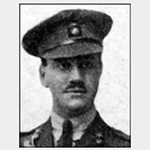Commemorated: | |||
| 1. Memorial: | Loos Memorial | Panel 20 to 22. Loos | |
| 2. Book: | The (1921) Masonic Roll of Honour 1914-1918 | Pg.116 | |
| 3. Memorial: | The (1940) Scroll - WW1 Roll of Honour | 27D GQS | |
Awards & Titles: | |||
Early Life :
Born c. 1877 to parents Baron David and Mrs Kate Barnett at Paddington, London. Between 1891 and 1911 he was living at the family home at 24 Fordingly Road, Paddington and later 33 Blomfield Road, West London together with siblings: David Baron (1876), Ray Maude (1878), Harriet Ethel (1879), Madeleine Constance (1880), Elsie Adrienne (1883), Gladys Amelia (1890).Family :
Probate record shows: BARNETT, Victor Baron of 61 St. Gabriel's Road, Cricklewood, Middlesex. Lieutenant in His Majesty's Army. Died 26th September 1915 in France. Administration at London 29th November to Baron David Barnett - Political Secretary. Effects £1866 12s 8d.Education & Career :
Stockbroker (1910)
Service Life:
Campaigns:
- The First World War 1914-1918, World-wide.
| Unit / Ship / Est.: 12/Northumberland Fusiliers |
12th (Service) Battalion Formed at Newcastle in September 1914 as part of K3 and attached to 62nd Brigade, 21st Division. Landed in France September 1915. 10 August 1917: amalgamated with 13th Bn, becoming 12/13th Battalion |
| Action : The Battle of Loos and associated actions |
"The Battle of Loos (25 September to 18 October 1915) was the major battle on the Western Front in 1915, surpassing in every respect all that had gone before in terms of numbers of men and materiel committed to battle. The preliminary bombardment was the most violent to date and the battle was charaterised by the committment of Regular and Territorial battalions on a large scale, in which the Territorials performed just as well as the Regulars. As the battles on the Western Front in 1915 increased in size and violence, so the casualties increased in proportion: Neuve Chapelle 12,000, Aubers Ridge/Festubert 29,000 , Loos 60,000. 1916 was to take the casualty cost to another level. Loos was intended as a minor role in support of French efforts around Arras but circumstances reduced the French effort. It marked the first use of poison gas by the British. Once the initial assualt had failed the battle continued in a series of actions mostly focused on the northern sector around the tactically important Hohenzollern Redoubt."
Detail :
Victor BARNETT is remembered on the STOCK EXCHANGE WAR MEMORIAL Lieutenant, 12th Battalion, Northumberland Fusiliers. Killed in action between 25th and 27th September 1915. No known grave. Commemorated on LOOS MEMORIAL, Pas de Calais, France, Panel 20 to 22. Clerk at the Exchange. The story of the 21st Division, of which the 12/Northumberland Fusiliers were part, is one of the most controversial of the Great War. The 21st and 24th Divisions were newly arrived in France and had been designated as Army Reserve under the direct command of Sir John French the Commander of the BEF. These divisions were entirely composed of Service (Kitchener) battalions made up of the willing volunteers of August and September 1914. Not only were the men inexperienced but so were the officers. There is a footnote in the Official History that suggests that the 62nd Brigade (which included the 12/Northumberland Fusiliers) had only one man out of the 4000 in the brigade who had any experience of war. This inexperience was to cost them dear in the evening of the 25th September 1915 and the following day during the Battle of Loos. As it became clear that the first phase of the battle on the morning of 25th September had stalled, Haig requested and received control of the 21st and 24th Divisions however they were too far away to arrive in theatre until the evening. No doubt their inexperience contributed but one can only imagine the problems of moving into the battlefield at night, with no reconnaissance, and much confusion from wounded and stragglers returning from the battle. The battalion was pushed into the line, companies being dispersed East of Loos village and on the front before Hill 70. At one point these piece-meal reinforcements were confused for a general relief and the hard pressed occupants of the front line retired en mass leaving the Northumberlands exposed. The situation was quickly corrected. The battalion sustained 481 casualties during their short time at Loos, and Victor BARNETT was one one of them. Source: http://www.roll-of-honour.com/London/StockExchange.html Official History Military Operations France and Belgium 1915 Vol II
Citations & Commemorations :
Newspaper Reference (Possibly 26th September 1942)"12th and 13th Battalions, Northumberland Fusiliers - In proud and affectionate memory of the Officers, Non-commissioned Officers and Men of these Battalions, who fell in action at "Hill 70," Loos, Sept. 26, 1915 - Major J.E.S. Woodman DSO, Capt. G Agnew, Capt E.T. Milton; Lts V.B. Barnett, R.W.L. Dodds, H.O. Hamilton, R.L. Knott, A.A. Piggot; 2nd Lts W. M. Allen, C.B. Dodds, G.A Howkins, J.M Milton, R. Oliver, T.S.H. Schafer, J Shufflebotham" - "Quo fata vocant" (Regimental motto - wither the fate calls)
Masonic :
| Type | Lodge Name and No. | Province/District : |
|---|---|---|
| Mother : | Samson No. 1668 E.C. | Hertfordshire |
Initiated | Passed | Raised |
10th October 1910 | 8th November 1910 | 10th January 1911 |
His father Baron David Barnett and his brother David Baron Barnett were also members of Samson Lodge.
Source :
The project globally acknowledges the following as sources of information for research across the whole database:
- The Commonwealth War Graves Commission
- The (UK) National Archives
- Ancestry.co.uk - Genealogy, Family Trees & Family History online
- ugle.org.uk - The records of the United Grand Lodge of England including the Library and Museum of Freemasonry
Additional Source:
- Founder Researchers : Paul Masters & Mike McCarthy
- Researcher : Bruce Littley

